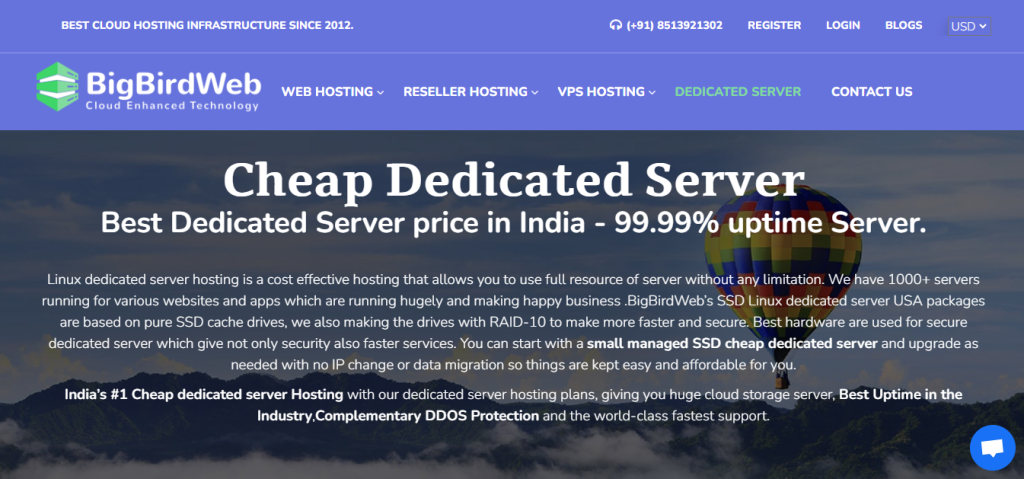In today’s rapidly evolving digital landscape, the dedicated hosting server has quickly become the new normal. As businesses and websites continue to expand, the demand for more reliable and high-performance hosting solutions has surged. This blog delves into why the dedicated hosting server is becoming the preferred choice for many businesses, explores its benefits, and provides guidance on selecting the right service for your needs

Table of Contents
What is a Dedicated Hosting Server?

A dedicated hosting server refers to a type of web hosting where an entire server is allocated exclusively to a single client. Unlike shared hosting, where multiple websites share the same server, a dedicated hosting server offers complete control over the server’s resources and settings. This exclusive setup means your website benefits from dedicated bandwidth, processing power, and storage.
Why Dedicated Hosting Server is Becoming the New Normal

- Superior Performance One of the key reasons why the dedicated hosting is becoming popular is its superior performance. In a shared hosting environment, multiple users share server resources, which can lead to slower load times and reduced performance, especially during peak traffic periods. With a dedicated hosting server, all server resources are devoted to your website, ensuring faster load times, better speed, and improved overall performance.
- Enhanced Security Security is a critical concern for any online business. A dedicated hosting server provides a higher level of security compared to shared hosting. With a dedicated server, you have full control over security settings and can implement advanced security measures tailored to your specific needs. This minimizes the risk of security breaches and helps protect sensitive data from potential threats.
- Customization and Control The dedicated hosting server offers unparalleled customization and control. Unlike shared hosting, where you are restricted by the limitations of the shared environment, a hosting server allows you to configure the server to meet your specific requirements. Whether you need custom software, specific applications, or special configurations, dedicated hosting gives you the flexibility to make these adjustments.
- Scalability As your business grows, so do your hosting needs. Dedicated hosting provides the scalability necessary to accommodate increased traffic and resource demands. You can easily upgrade server hardware or resources as needed, ensuring that your website remains efficient and responsive even as it expands.You can also opt for free web hosting.
- Dedicated Resources With dedicated hosting, all server resources, including CPU, RAM, and bandwidth, are allocated exclusively to your website. This means you don’t have to compete with other users for resources, resulting in better performance and reliability. Dedicated resources ensure that your website can handle high traffic volumes and demanding tasks without experiencing slowdowns or interruptions.
- Compliance and Data Control For businesses operating in regulated industries, compliance with data protection regulations is crucial. Dedicated hosting allows you to maintain control over where your data is stored and how it is managed. This level of control is essential for meeting legal and regulatory requirements, providing peace of mind for businesses concerned about data security and compliance.
Cost Considerations
While the benefits of a dedicated hosting are substantial, it’s important to consider the cost. Dedicated hosting solutions are typically more expensive than shared hosting options due to the exclusivity and additional features they offer. However, the investment can be justified for businesses that require high performance, enhanced security, and greater control over their hosting environment.
Selecting the Right Dedicated Hosting Server Provider
Choosing the right provider for your dedicated hosting server is crucial to maximizing the benefits of your hosting solution. Here are some factors to consider when selecting a provider:
- Reputation and Reliability Look for a provider with a strong reputation for reliability and uptime. The performance of your dedicated hosting server is only as good as the provider’s infrastructure and support. Ensure that the provider has a proven track record of delivering consistent performance and minimal downtime.
- Support Services Evaluate the level of support offered by the provider. Dedicated hosting requires ongoing management and maintenance, so it’s important to have access to familiar support staff. Check if the provider offers 24/7 support, and inquire about the types of assistance available, such as technical troubleshooting and server management.
- Customization Options Different businesses have different needs, so it’s important to choose a provider that offers customization options for your dedicated hosting. Ensure that the provider allows you to configure the server to meet your specific requirements and provides flexibility in terms of hardware and software choices.
- Security Features Security should be a top priority when selecting a dedicated hosting provider. Look for providers that offer robust security features, such as firewalls, DDoS protection, and regular security updates. Ensure that the provider’s security measures align with your business’s needs and compliance requirements.
- Pricing and Contracts Compare pricing and contract terms among different dedicated hosting providers. While cost is an important factor, it should be balanced with the quality of service and features offered. Look for providers that offer transparent pricing, flexible contract terms, and options for scaling resources as needed.
- Performance and Uptime Guarantees Verify the provider’s performance and uptime guarantees. Dedicated hosting should offer high availability and reliability, so it’s important to choose a provider that can deliver on these promises. Check for service level agreements (SLAs) that outline uptime guarantees and compensation for any downtime.
- Backup and Recovery Solutions Ensure that the dedicated hosting provider offers backup and recovery solutions. Regular backups are essential for protecting your data and ensuring business continuity in the event of a failure or data loss. Check if the provider includes automated backups and offers easy recovery options.
The Future of Dedicated Hosting Servers
As technology continues to advance, the role of the dedicated hosting server is likely to evolve. However, the fundamental benefits of performance, security, and control will remain relevant. Businesses will continue to seek out dedicated hosting server solutions that offer reliable performance, robust security, and customization options.
The growing demand for high-performance hosting solutions is likely to drive innovation in the dedicated hosting server market. Providers may introduce new features, improved security measures, and enhanced support services to meet the evolving needs of businesses. As a result, the dedicated hosting server will continue to be a popular choice for organizations seeking to optimize their online presence.
FAQs
1. What is dedicated hosting ?
Dedicated hosting is a type of web hosting where an entire server is allocated to a single client. Unlike shared hosting, where multiple websites share the same server, a dedicated hosting server provides exclusive access to all server resources for one website or business.
2. Why should I choose dedicated hosting over shared hosting?
Dedicated hosting offers superior performance, enhanced security, and greater control compared to shared hosting. With a dedicated server, you have exclusive access to all server resources, which leads to faster load times, improved performance, and better security for your website.
3. How does a dedicated hosting server improve website performance?
A dedicated hosting server improves website performance by providing all server resources exclusively to your website. This eliminates the resource competition found in shared hosting environments, resulting in faster load times and better handling of high traffic volumes.
4. Is a dedicated hosting server more secure than shared hosting?
Yes, dedicated hosting is generally more secure than shared hosting. With a dedicated server, you have full control over security settings and can implement customized security measures. This reduces the risk of security breaches and provides better protection for sensitive data.
5. What are the cost considerations for a dedicated hosting server?
A dedicated hosting server is typically more expensive than shared hosting due to the exclusivity and additional features it offers. However, the investment can be worthwhile for businesses that require high performance, enhanced security, and greater control over their hosting environment.
6. How do I choose the right dedicated hosting provider?
When selecting a dedicated hosting provider, consider factors such as reputation, support services, customization options, security features, pricing, and performance guarantees. Choose a provider that meets your specific needs and offers reliable performance and support.
7. What are the benefits of having dedicated resources on a dedicated hosting server?
Having dedicated resources on a dedicated hosting server ensures that all server resources, including CPU, RAM, and bandwidth, are allocated exclusively to your website. This results in better performance, reliability, and the ability to handle high traffic volumes without slowdowns or interruptions.
8. Can a dedicated hosting server be scaled as my business grows?
Yes, dedicated hosting can be scaled to accommodate increased traffic and resource demands. You can easily upgrade server hardware or resources as needed, ensuring that your website remains efficient and responsive as your business expands.
9. What type of support should I expect from a dedicated hosting server provider?
A dedicated hosting server provider should offer comprehensive support services, including 24/7 technical assistance. Look for providers that offer expert support for server management, troubleshooting, and optimization to ensure that your website runs smoothly.
10. How does dedicated hosting help with compliance and data control?
A dedicated hosting allows you to maintain control over where your data is stored and how it is managed. This level of control is essential for meeting legal and regulatory requirements, providing peace of mind for businesses concerned about data security and compliance.
Bonus Content: Maximizing the Benefits of Your Dedicated Hosting Server
To fully leverage the advantages of a dedicated hosting server, consider the following tips and best practices:
- Regular Maintenance and Monitoring Keep your dedicated hosting in top condition by performing regular maintenance and monitoring. Regularly update software, check for security vulnerabilities, and monitor server performance to ensure optimal operation.
- Optimize Your Server Configuration Tailor your dedicated hosting configuration to your specific needs. Optimize server settings for your website’s requirements, such as adjusting the cache settings, managing database performance, and fine-tuning server parameters.
- Implement Robust Backup Solutions Protect your data with robust backup solutions. Schedule regular backups and ensure that backup processes run smoothly. Having a reliable backup system in place will help you quickly recover from data loss or server failures.
- Enhance Security Measures Strengthen the security of your dedicated hosting server by implementing advanced security measures. Use firewalls, intrusion detection systems, and regular security audits to safeguard your server against potential threats.
- Utilize Content Delivery Networks (CDNs) Improve your website’s performance and speed by utilizing Content Delivery Networks (CDNs). CDNs cache your website’s content and deliver it from servers closest to your users, reducing load times and enhancing the user experience.
- Monitor Resource Usage Keep a close eye on resource usage to ensure that your dedicated hosting server operates efficiently. Monitor CPU, RAM, and bandwidth usage to identify any potential bottlenecks and optimize resource allocation.
- Plan for Scalability As your business grows, plan for scalability to accommodate increased traffic and resource demands. Work with your dedicated hosting server provider to upgrade hardware or resources as needed, ensuring seamless growth and performance.
- Utilize Automation Tools Simplify server management by utilizing automation tools. Automation can help with routine tasks such as backups, updates, and monitoring, allowing you to focus on other aspects of your business.
- Optimize Website Performance Enhance your website’s performance by optimizing code, reducing image sizes, and implementing efficient caching strategies. A well-optimized website will perform better on a dedicated hosting server and provide a superior user experience.
- Stay Informed about Trends and Updates Stay informed about the latest trends and updates in the hosting industry. Keeping up-to-date with new technologies and best practices will help you make the most of your dedicated hosting server and ensure that your hosting solution remains cutting-edge.
By following these best practices, you can maximize the benefits of your dedicated hosting server and ensure that your website runs smoothly, securely, and efficiently.
Final Thoughts
The dedicated hosting server is rapidly becoming the new normal in the world of web hosting. Its superior performance, enhanced security, and unparalleled customization make it an ideal choice for businesses seeking to optimize their online presence. While the cost may be higher than shared hosting, the investment is well worth it for the benefits it provides. By choosing the right provider and following best practices, you can ensure that your dedicated hosting server meets your business’s needs and supports its growth and success.
FAQs
1. What is a dedicated hosting server?
A dedicated hosting is a type of web hosting where an entire server is allocated to a single client. Unlike shared hosting, where multiple websites share the same server, a dedicated hosting server provides exclusive access to all server resources for one website or business.
2. Why should I choose a dedicated hosting server over shared hosting?
A dedicated hosting offers superior performance, enhanced security, and greater control compared to shared hosting. With a dedicated server, you have exclusive access to all server resources, which leads to faster load times, improved performance, and better security for your website.
3. How does a dedicated hosting improve website performance?
A dedicated hosting server improves website performance by providing all server resources exclusively to your website. This eliminates the resource competition found in shared hosting environments, resulting in faster load times and better handling of high traffic volumes.
4. Is a dedicated hosting more secure than shared hosting?
Yes, dedicated hosting is generally more secure than shared hosting. With a dedicated server, you have full control over security settings and can implement customized security measures. This reduces the risk of security breaches and provides better protection for sensitive data.
5. What are the cost considerations for a dedicated hosting?
A dedicated hosting server is typically more expensive than shared hosting due to the exclusivity and additional features it offers. However, the investment can be worthwhile for businesses that require high performance, enhanced security, and greater control over their hosting environment.
6. How do I choose the right dedicated hosting server provider?
When selecting a dedicated hosting server provider, consider factors such as reputation, support services, customization options, security features, pricing, and performance guarantees. Choose a provider that meets your specific needs and offers reliable performance and support.
7. What are the benefits of having dedicated resources on a dedicated hosting server?
Having dedicated resources on a dedicated hosting ensures that all server resources, including CPU, RAM, and bandwidth, are allocated exclusively to your website. This results in better performance, reliability, and the ability to handle high traffic volumes without slowdowns or interruptions.
8. Can a dedicated hosting server be scaled as my business grows?
Yes, a dedicated hosting can be scaled to accommodate increased traffic and resource demands. You can easily upgrade server hardware or resources as needed, ensuring that your website remains efficient and responsive as your business expands.
9. What type of support should I expect from a dedicated hosting server provider?
A dedicated hosting server provider should offer comprehensive support services, including 24/7 technical assistance. Look for providers that offer expert support for server management, troubleshooting, and optimization to ensure that your website runs smoothly.
10. How does a dedicated hosting server help with compliance and data control?
A dedicated hosting allows you to maintain control over where your data is stored and how it is managed. This level of control is essential for meeting legal and regulatory requirements, providing peace of mind for businesses concerned about data security and compliance.
By understanding the benefits and best practices of using a dedicated hosting server, businesses can make informed decisions that support their growth and success in the digital world.
